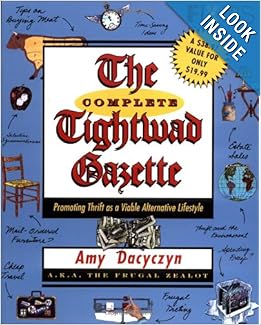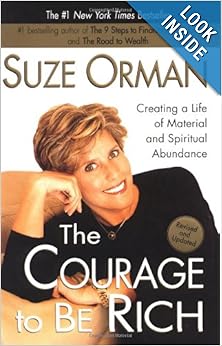Chilly winter nights can make reading for pleasure…well, a pleasure. Now that dark has descended by suppertime, I spend at least a few evenings a week, coffee cup and afghan in hand, exploring ways to live and invest better. These books showed up on my radar in 2013 — and earned their way into my permanent PF library. Some are oldies-but-goodies, but worth giving some time to. You’ll find them helpful, too,
The Millionaire Next Door by Thomas Stanley. The best book, hands-down, for rethinking your financial strategy — and helping you plan for the future. I reread this book every year, as well as Stanley’s Millionaire Mind and The Millionaire Woman Next Door.
Ordinary People, Extraordinary Wealth: The 8 Secrets of How 5,000 Ordinary American Became Successful Investors — And How You Can Too by Ric Edelman. Edelman interviewed 5,000 of his clients in depth, then formulated their responses into eight ‘secrets’ that they used to gain financial security. Although I didn’t always agree with every rule (like carrying a mortgage, even when you can afford to pay it off), these gave me plenty to think about — particularly the sections (in their own words) on “The Biggest Mistake I Ever Made,” “The Smartest Thing I Ever Did,” “The Obstacles I Faced,” and the special winner: “My Advice for You.”
This book got bad reviews on Amazon. partly because it was pegged as a sales commercial for Edelman’s firm. Don’t let that stop you. The people profiled are largely not entrepreneurs — something Millionaire Next Dooremphasizes. But they’ve made their fortunes by saving steadily over the decades, combined with wise spending.No doubt wise investment choices helped — but it’s not the primary reason why they succeeded.
It’s A Long Way From Penny Apples by Bill Cullen. The inspiring memoir of a kid from the Irish slums who made good… but I also learned a lot of useful advice along the way. (Case in point: sleep less, and you’ve got more time to study and work.)
Reminiscences of a Stock Operator by Edwin LeFevre. I was surprised at the matter-of-fact tone and practical advice this ‘bio’ provided for today’s investor, even though it was written decades ago. This annotated edition talks about the life of Jesse Livermore, the mogul it’s thought to be based on, plus updated info on today’s market.
The Complete Tightwad Gazette by Amy Dacyczyn. If you can only afford one frugal living compendium — this is it. Think of it as an encyclopedia crammed full of interesting ways to celebrate the holidays, birthdays, etc. — plus save money on everyday necessities. The book’s older — but its information is anything but stale.
Yankee Magazine’s Living Well on A Shoestring: 1,501 Ingenious Ways to Spend Less For What You Need and Have More For What You Want by the editors of Yankee Magazine. Why do frugal tip books have such long subtitles? I have no idea…but I do know that this book is chockful of usable ideas for every aspect of your life, whether you live in a city condo or out in the country.
How to Retire the Cheapskate Way by Jeff Yeager. I reviewed this book in an earlier post, so won’t say much…but it’s down to earth, with a number of different approaches you could take.
How to Survive Without A Salary by Charles Long. Can you really do this? Yes, actually you can, provided you’re willing to make some changes in wants and desires vs. needs. Pair it with Jeff Yeager’s book, and you can come up with some workable strategies toward what you really want.
The Courage to be Rich: Creating A Life of Spiritual and Material Abundance by Suze Orman. One of those authors, like Dave Ramsey, who’s equally loved and hated. Suze has flipflopped on some of her basic ‘rules’ lately — her stance on credit cards (now she says you don’t necessarily need or want to pay them off) is particularly frightening. But this earlier book had a huge impact on realizing how much my approach to finances was being influenced by childhood memories. It’s another book to reread regularly, to get me out of my rut and consider new approaches.
Living Rich For Less: Create The Lifestyle You Want By Giving, Saving and Spending Smart by Ellie Kay. Another surprise — I figured this would be more-of-the-same stuff on frugal living, written from a family viewpoint. But Ellie not only provides workable ideas for any budget — she covers divorce, remarriage and bringing up children, too. (Her other books are good, as well.) Eminently practical, written by someone who’s lived through it, and come out a better person.
What are some of your favorite books on personal finance and frugal living?






Ramit Sethi’s book got me going. Generation Earn is also a good one.
For me, The Richest Man in Babylon. Timeless truth. Big thumbs up for the Millionaire Next Door as well!
#1 The Millionaire Next Door. Best personal finance book. End of story.
Some very good books on that list. The one that got me really thinking differently about money was The Automatic Millionaire by David Bach. The lessons there were some of the foundation I used when starting my own finance site. I am all about making money management easy.
Thanks for the suggestions. I’ve heard of a couple of them and hopefully I will get into a few on your list. The Millionaire Next Door seems to be the book by which all others are measured, so I will start there!
[…] isn’t always.) Check the same item at other stores in your area. (Some, like Amy Dacyzyn of Tightwad Gazette fame, even advocate keeping a price book of the items you use […]